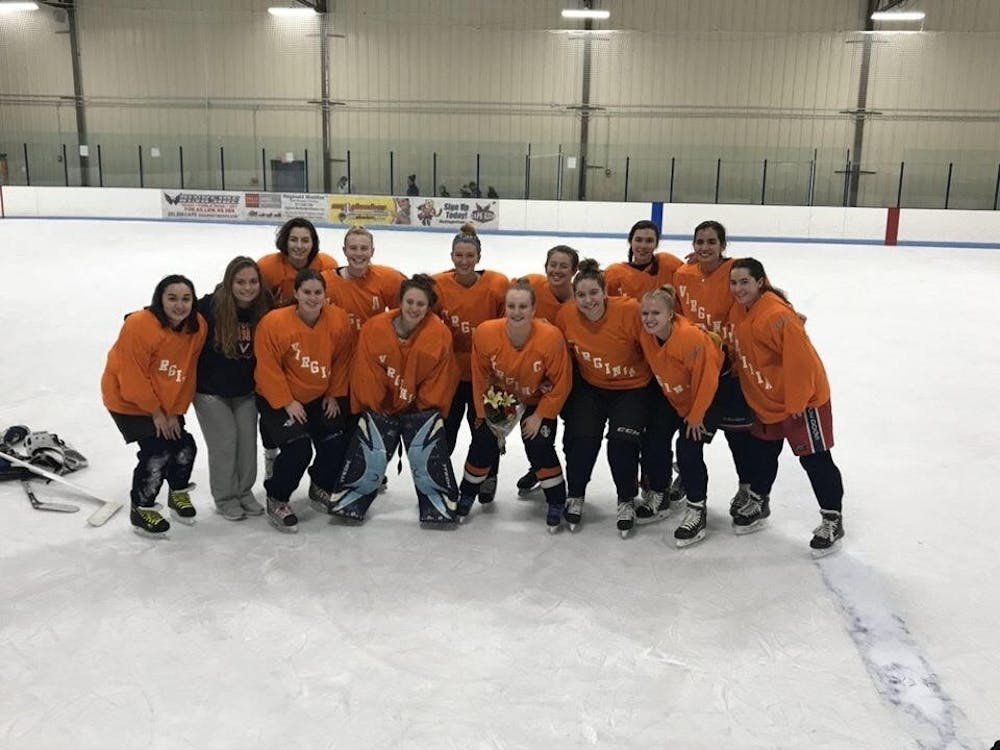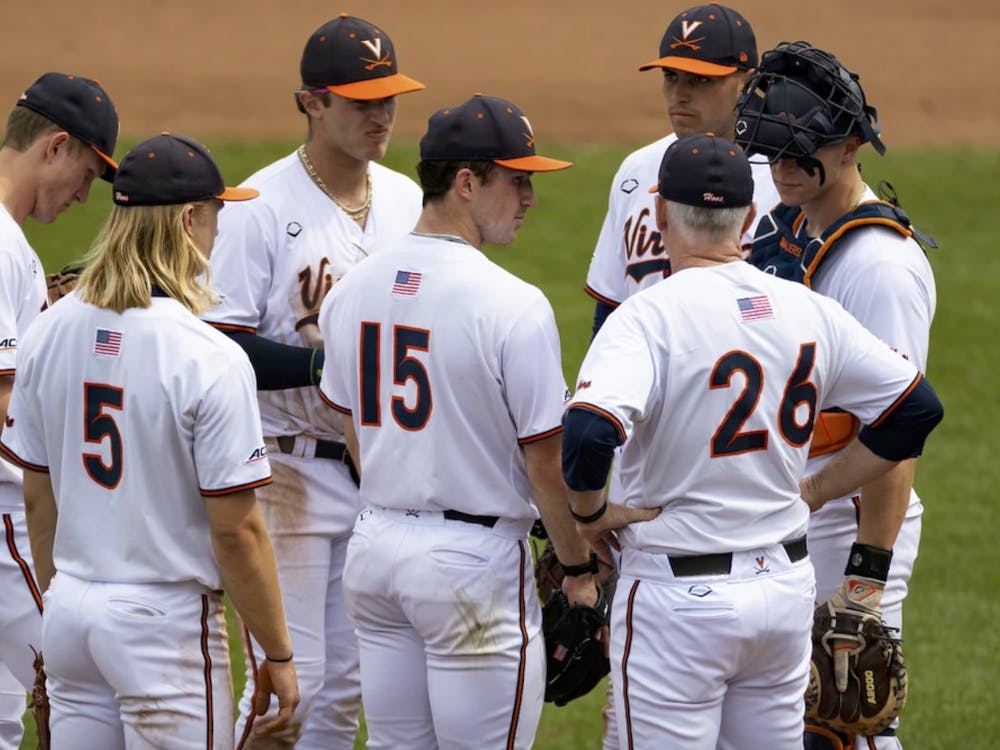Since 2000, the Women’s Ice Hockey Club at the University has provided students a tight-knit community where they can make friends, pursue their passion and find a home on Grounds. Despite facing several obstacles, the team’s members continue to persevere and find ways to play a sport that brings them all together.
The team features an eclectic mix of University students. Some have played ice hockey throughout their lives and competed in the sport prior to coming to Charlottesville. Others have less experience and never even considered playing ice hockey until they came to the University.
For Kelly Townsend, third-year College student and club president, joining the team was a no-brainer. Few schools in the Mid-Atlantic have a substantial ice hockey presence, so the University offers players with extensive backgrounds in the sport a unique opportunity.
“I grew up playing hockey, I've just always played,” Townsend said. “Actually, the fact that, out of the three schools I got into, U.Va. was the only one with a woman's club team factored into my college decision … It's what I've always done, I have to keep doing it.”
Many of the team’s more experienced members — like Townsend and Meaghan McGowan, fourth-year Engineering student and vice president — have deep New England and ice hockey roots. For these students, moving to Charlottesville was a culture shock and joining an ice hockey team was the perfect way to adjust to their new surroundings.
“I'm from Connecticut,” McGowan said. “My dad is Canadian. He played D-I college hockey and he played semi-professionally. So, it was just something I always did growing up … So when I got down here, it was kind of a way for me to introduce myself to the U.Va. community and feel comfortable and feel like I was at home.”
However, prior experience is certainly not a requirement to join the Women’s Ice Hockey Club. In fact, the majority of the team is relatively new to the sport. While Townsend and McGowan grew up playing, others were first exposed at the University.
There are a number of reasons why new students with no ice hockey experience might be attracted to the Women’s Ice Hockey Club. First and foremost, ice hockey isn’t commonly played in the region and, therefore, the club offers a unique experience.
“I think it's something that's really different,” McGowan said. “It's not something you see a lot in Virginia … so I think when they see us at the Activities Fair, and we're waving around our sticks or whatever, it's a little bit of an intrigue.”
Moreover, the team prides itself on being one of the most inclusive sports organizations on Grounds. Unlike other sports clubs at the University, the Women’s Ice Hockey Club requires relatively little commitment and doesn’t hold tryouts. In addition, the team is devoted to helping the newer players learn. Every member of the team receives playing time, and Coach Tony DiOrio helps players with the fundamentals of the game. In short, the club tries to ensure all players — regardless of their experience or background — can enjoy being on the team.
“I think a lot of people have this misconception that they need to have played before,” McGowan said. “Or they need to have been able to skate or anything. A lot of our best players, throughout the course of time that I've been on the team, have been people that didn't play before, or played field hockey or soccer or lacrosse in high school. And the biggest hurdle is just getting them out on the ice and getting them skating.”
However, both Townsend and McGowan admitted that, despite the positives, there are many challenges the club faces that sometimes discourage newer players from joining and, even, older players from returning.
The first obstacle is the club’s access to an ice rink for practices and games. For years, Main Street Arena on the Downtown Mall was the home of the University’s ice sports teams and the only rink in the Charlottesville area. However, after the arena closed in April 2018, the Women’s Ice Hockey Club had to find a new location to accommodate its needs.
The club’s only viable solution to the absence of a local rink is to travel farther distances. The team now practices in the Richmond area at facilities like Richmond Ice Zone and SkateNation Plus. For home games, the team travels an hour and a half to the Haymarket IcePlex in Haymarket, Va.
“It's a lot of travel time, we try to adjust for it as much as possible by doing really early morning Sunday practices so that everyone can still have their full day ahead of them and the ability to do other things,” Townsend said.
Traveling 20 to 25 hours a month during the season is not only a nuisance, but, according to McGowan, hurts the team’s performance on the ice as well. In fact, the club won its division in the Delaware Valley Collegiate Hockey Conference in the last year it played in Charlottesville. Since Main Street Arena closed its doors, the team hasn’t won another championship and actually dropped to a lower division.
Given that the club can only practice six or seven times a year due to the distance to the rink and that the extensive travel is a tough selling point for new players, the lack of a nearby ice rink is a serious obstacle that other teams in the club’s division — George Mason, IUP, Lafayette, Saint Joseph’s and Slippery Rock — don’t have to deal with.
Another issue the team faces is financial pressure. Ice hockey is a relatively expensive sport to play, and, unlike varsity student-athletes, the financial burden is primarily placed on the players themselves. While Student Council does provide the club some funding, the entirety of the budget is used to buy ice time for the team, with none left over for the actual equipment the players need.
“We try to help girls out as much as we can because we know, if you're trying a new sport and the equipment fee up front is $500, there's no way that we're going to get girls to play,” McGowan said. “So as much as we possibly can, we try to help them out in the first season or two.”
McGowan further highlighted the disparity that exists between club teams at the University in terms of resources. For example, she pointed out that the Men’s Ice Hockey Club has more well-connected alumni, a stronger booster system and membership dues that “are like five times higher.”
”I mean, even with our dues this season, we had a lot of players who are just shocked by the numerical value, but these are the lowest dues we've paid in like three years,” Townsend said.
Although the Women’s Ice Hockey Club certainly needs more resources, McGowan and Townsend both emphasized that the positives of being on the team outweigh the challenges.
McGowan noted the community the team has built and all the memories the players have made together, while Townsend described the club as “the first group of friends [she] made at U.Va.” From competing in tournaments to hilarious car rides and hotel stays, the club seems to have an endless collection of fun stories.
In 2018, shortly after Main Street Arena closed, Sarah Walshak, who was the women’s ice hockey president and assistant captain at the time, commented on the team’s future given the difficult circumstances.
“Most people seemed pretty dedicated to the idea that [ice hockey] is something they want to continue doing,” Walshak said. “It’s something they really love, so people seem willing to go the extra mile and to pay the extra money. ”
Now, two years later, it appears that Walshak was exactly right. Regardless of the extraordinary hurdles they’ve had to overcome, the members of the Women’s Ice Hockey Club are as dedicated as ever to their sport, team and community.







